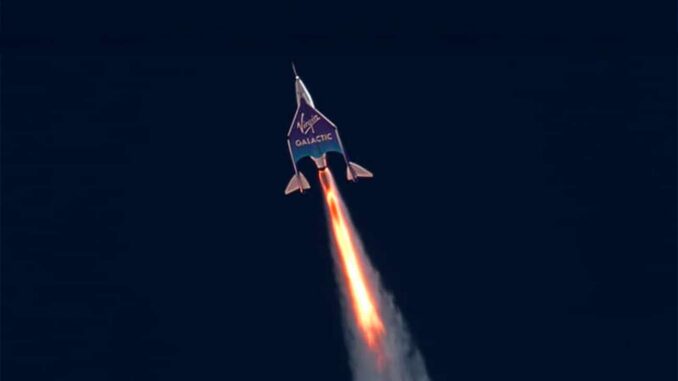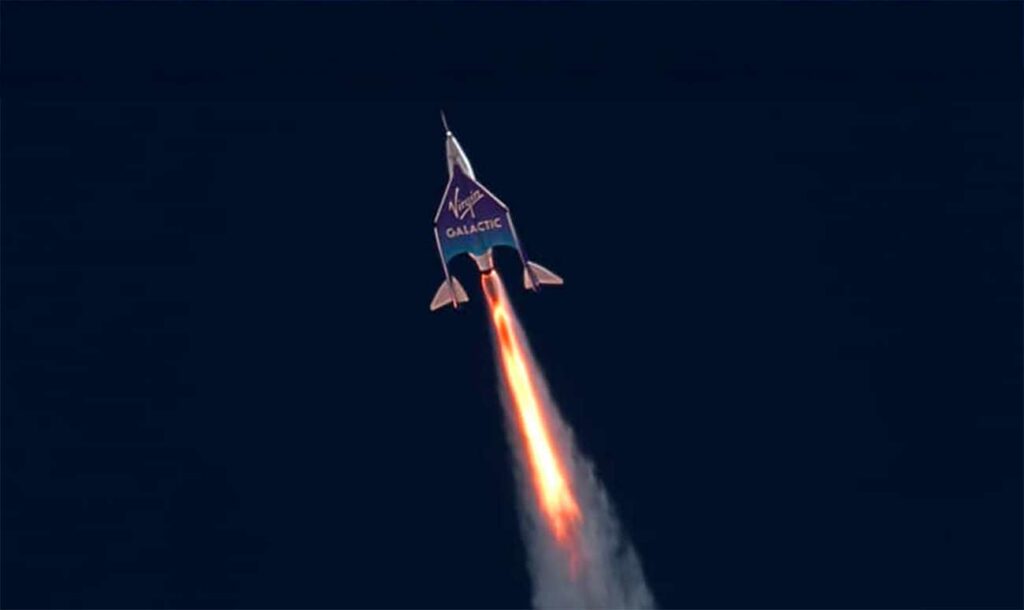
Virgin Galactic is finalizing its new Delta aircraft for commercial suborbital flights in 2026, with a price tag of over €600,000.
Virgin Galactic, an American company specializing in suborbital flights, has confirmed the smooth progress of production of its fleet of next-generation spacecraft, called Delta-class SpaceShips. These aircraft are expected to begin commercial flights in summer 2026, following a series of test flights in the spring. The first tickets will be for flights carrying scientific payloads, followed by flights for private passengers in the fall.
Development is progressing on the structural, propulsion and avionics aspects, with a gradual reduction in costs as heavy investment comes to an end. At the same time, Virgin is studying the military and commercial use of its high-altitude carrier aircraft and is considering operating from Italy.

Manufacturing of Delta spacecraft on schedule
Virgin Galactic has confirmed that production of its new Delta-class aircraft is progressing according to schedule. These suborbital vehicles, designed to provide regular commercial capacity, are in the assembly phase, with concrete progress in the areas of structure, propulsion and avionics systems.
According to CEO Michael Colglazier, the company is currently coordinating significant work between its own teams and its main suppliers, particularly on finalizing the necessary production tools. He announced the launch of a series of regular communications on the status of production starting in June 2025.
The first test flights of the Delta SpaceShips are scheduled for spring 2026, approximately one year after the announcement. These tests will precede the first commercial flights with scientific payloads in the summer, followed by manned missions in the fall.
The technical development of these aircraft required a phase of intensive tooling expenditure, which has now peaked. Virgin can now focus its resources on assembling the first two aircraft. This milestone marks a transition from development to industrial production.
An evolving pricing strategy and commercial launch in 2026
Virgin Galactic plans to open ticket sales for its suborbital flights in the first quarter of 2026. This will be organized in successive waves through a high-end customer experience, allowing the company to adjust its pricing based on demand.
The new prices have not yet been set, but they will be higher than the US$600,000 (approximately €550,000) charged during the last sales campaigns. This increase is due to the higher quality of the services, the exclusivity of the service, and the low volume of flights available at launch.
The commercial objective is twofold:
- Scientific research, via payloads carried during the first few months.
- The private astronaut market, targeted for fall 2026, which represents a high value-added segment.
The challenge will be to ensure operational regularity with a limited fleet, which will require rigorous logistics and a stable supply chain for critical parts, particularly those related to propulsion and composite materials.
Military use of the WhiteKnightTwo carrier planned
Virgin’s SpaceShip is launched at high altitude from a carrier aircraft, the WhiteKnightTwo, capable of flying at 18,000 meters with heavy loads. This capability is attracting the attention of the military sector and defense agencies, particularly for surveillance, intelligence, and strategic defense missions.
Virgin Galactic has entered into discussions with representatives of the US Department of Defense and aerospace manufacturers to explore alternative uses for the carrier. The company cites potential opportunities under the US Golden Dome program, a missile defense system designed to neutralize ballistic threats at high altitudes.
The aircraft could serve as an airborne sensor platform, extend surveillance time in sensitive areas, or be adapted for secure communications, radar interception, or microsatellite launch missions.
These prospects broaden Virgin’s business model, allowing it to diversify its revenue streams beyond space tourism while leveraging its expertise in high-altitude airborne technology.

European location under consideration: Italy as operational base
Virgin Galactic is considering opening a launch site in Europe, with Grottaglie Airport in southern Italy as the leading candidate. This choice would enable the company to serve a wealthy European clientele and expand its offering outside the United States.
One of the challenges identified remains airspace, which will need to be partially reserved during the launch and descent phases. Feasibility will depend on local weather conditions, regional air traffic, and the agreement of the Italian and European civil aviation authorities.
A location in Italy would also involve:
- Adapting ground infrastructure to accommodate the carrier aircraft and passengers.
- Training technical personnel on site.
- Establishing a legal framework in accordance with European space law.
This project could strengthen Virgin Galactic’s industrial presence in Europe, while creating a secondary space hub to meet growing demand for experimental and tourist flights in the Euro-Mediterranean region.
A tense but controlled financial situation
In the first quarter of 2025, Virgin Galactic generated $0.5 million (approximately €460,000) in revenue, with an adjusted EBITDA loss of $72 million (approximately €66 million). This imbalance is due to the intensity of recent investments.
However, the company says it has passed the peak of spending on production tools, which will enable it to reduce losses per quarter by the end of 2025. This transition to mass production must be accompanied by better cash flow management.
To maintain its financial viability, Virgin will need to:
- Limit its recurring operating expenses.
- Ensure a rapid ramp-up following the first successful flights.
- Convert its pre-order backlog into actual cash flow.
The company is therefore playing a strategic game, balancing technological consolidation, the search for profitability, and commercial expansion in a market that is still under construction.
War Wings Daily is an independant magazine.